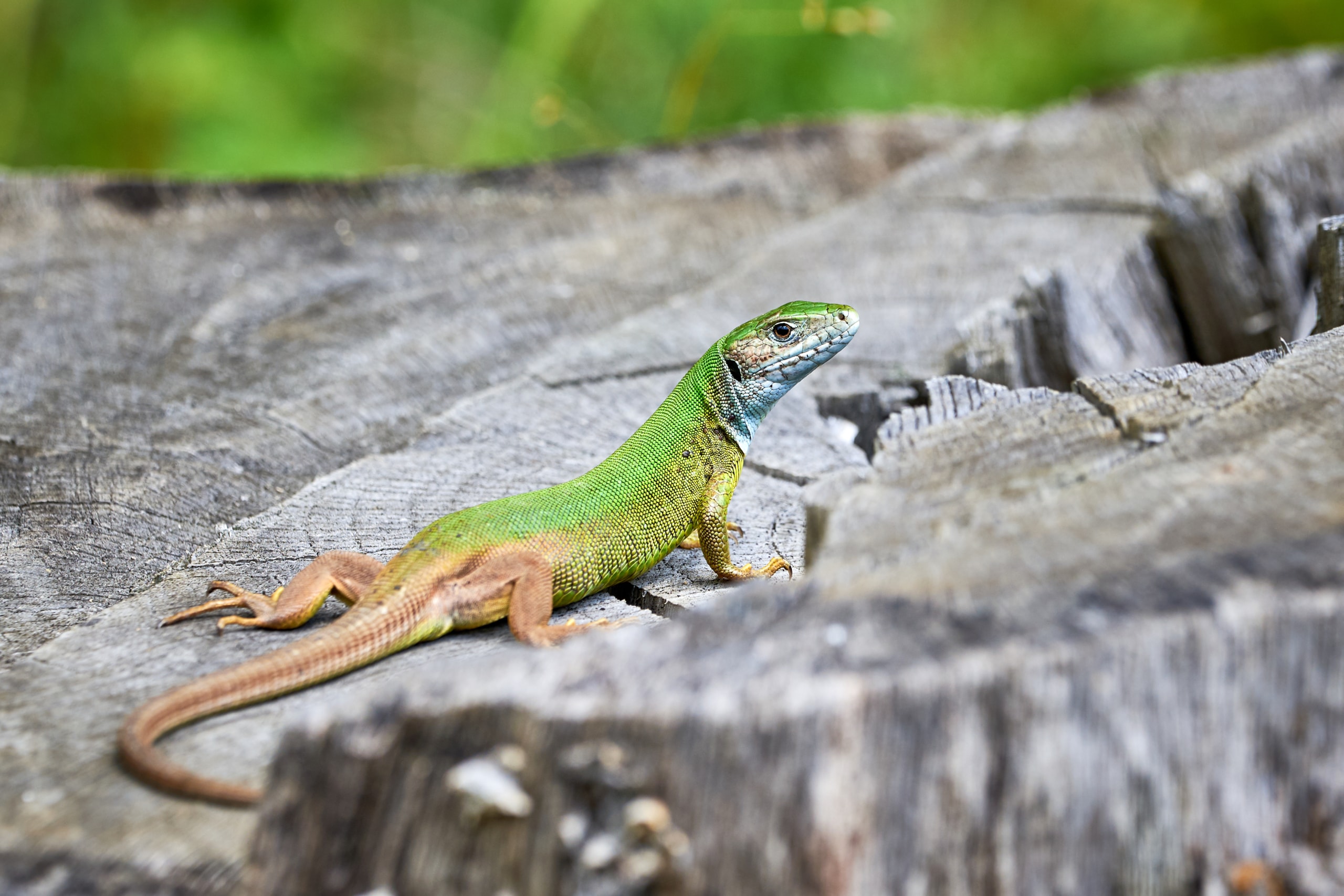Does Islam Say That Lizards Are Evil?
Hanafi Fiqh
Answered by Shaykh Yusuf Weltch
Question
Does Islam say that lizards are evil? Does this apply to all lizards or just the specific type that blew on the fire of Ibrahim (Peace be upon him)?
Answer
In the Name of Allah, the Most Merciful and Compassionate
All animals are good in so far as Allah Most High created them with wisdom, and they are fulfilling their existential purposes.
No animals are evil in themselves. However, they can be dangerous and harmful. Therefore some animals are killed only when needed to protect themselves and others from their harm.
Protecting Oneself from Geckos
For this reason, the Messenger (may Allah bless him and give him peace) commanded the killing of the geckos and called them corrupt (fuwaysiqa).” [Muslim]
The word corrupt (fasiq) in Arabic literally means anything that goes beyond the bounds. Because it is poisonous, the Messenger (may Allah bless him and give him peace) called it fasiq or corrupt and encouraged killing it. [‘Ali Qari, Mirqat al-Mafatih]
Note that the permission and encouragement to kill these poisonous lizards applies whether the threat is actual or even potential.
Is the Lizard Evil?
Imam al-Bukhari (Allah have mercy on him) narrates from Umm Sharik (Allah be pleased with her) that the Messenger of Allah (may Allah bless him and give him peace) instructed her to kill the gecko and said, “It used to blow on (the fire of) Ibrahim (peace be upon him).” [Bukhari; Muslim]
In the commentary of this narration, Mulla ‘Ali Qari quotes al-Qadi ‘Iyad (Allah have mercy on them), saying, “This (final) statement indicates to the foulness of this type of gecko, its harms, and that it has reached such a level that it is was used by Shaytan to blow on the fire – which the ‘friend of Allah’ Ibrahim (peace be upon him) was thrown into – to make it burn more.” [‘Ali Qari, Mirqat al-Mafatih]
Mulla ‘Ali Qari then quotes Ibn al-Malak (Allah have mercy on them), saying, “One of its (the gecko’s) obsessions is to spoil food, especially salt. If it can’t get to the food to spoil it, it will climb on the ceiling and drop its droppings near it. Also, in this narration is an explanation that its nature is to cause harm.” [Ibid.]
With the above, we can see that the nature of the gecko is to cause harm, it’s dangerous, and we are encouraged to kill it to protect ourselves and others from its harm. For this reason, one can use the word evil to describe the gecko. However, the words dangerous and harmful are a more proper analysis.
Hope this helps
Allah knows best
[Shaykh] Yusuf Weltch
4119 – (وَعَنْ أُمِّ شَرِيكٍ – رَضِيَ اللَّهُ عَنْهَا -) : وَهِيَ عَزْمَةُ بِنْتُ دُودَانَ بِضَمِّ الدَّالِّ الْمُهْمَلَةِ الْأُولَى الْقُرَشِيَّةُ الْعَامِرِيَّةُ لَهَا صُحْبَةٌ، أَوْ أُمُّ شَرِيكٍ الْأَنْصَارِيَّةُ وَاللَّهُ أَعْلَمُ. ( «أَنَّ رَسُولَ اللَّهِ – صَلَّى اللَّهُ عَلَيْهِ وَسَلَّمَ – أَمَرَ بِقَتْلِ الْوَزَغِ» ) : بِوَاوٍ مَفْتُوحَةٍ وَزَايٍ كَذَلِكَ وَبِمُعْجَمَةٍ وَاحِدُهَا وَزَغَةٌ، وَهِيَ دُوَيْبَةٌ مُؤْذِيَةٌ وِسَامُّ أَبْرَصَ كَبِيرُهَا. ذَكَرَهُ ابْنُ الْمَلَكِ، وَفِي النِّهَايَةِ: الْوَزَغُ جَمْعُ وَزَغَةٍ بِالتَّحْرِيكِ وَهِيَ الَّتِي يُقَالُ لَهَا سَامُّ أَبْرَصَ (وَقَالَ) : أَيِ النَّبِيُّ – صَلَّى اللَّهُ عَلَيْهِ وَسَلَّمَ – (كَانَ) : أَيِ الْوَزَغُ (يَنْفُخُ عَلَى إِبْرَاهِيمَ) . أَيْ عَلَى نَارٍ تَحْتَهُ. قَالَ الْقَاضِي: بَيَانٌ لِخُبْثِ هَذَا النَّوْعِ وَفَسَادِهِ، وَأَنَّهُ بَلَغَ فِي ذَلِكَ مَبْلَغًا اسْتَعْمَلَهُ الشَّيْطَانُ، فَحَمَلَهُ عَلَى أَنْ نَفَخَ فِي النَّارِ الَّتِي أُلْقِيَ فِيهَا خَلِيلُ اللَّهِ – عَلَيْهِ الصَّلَاةُ وَالسَّلَامُ – وَسَعَى فِي اشْتِعَالِهَا، وَهُوَ فِي الْجُمْلَةِ مِنْ ذَوَاتِ السُّمُومِ الْمُؤْذِيَةِ. قَالَ ابْنُ الْمَلَكِ: وَمِنْ شَغَفِهَا إِفْسَادُ الطَّعَامِ خُصُوصًا الْمِلْحَ، فَإِنَّهَا إِذَا لَمْ تَجِدْ طَرِيقًا إِلَى إِفْسَادِهِ ارْتَقَتِ السَّقْفَ وَأَلْقَتْ خَرَأَهَا فِي مَوْضِعٍ يُحَاذِيهِ. وَفِي الْحَدِيثِ بَيَانُ أَنَّ جِبِلَّتَهَا عَلَى الْإِسَاءَةِ. (مُتَّفَقٌ عَلَيْهِ) .
——–
ص2671 – كتاب مرقاة المفاتيح شرح مشكاة المصابيح – باب ما يحل أكله وما يحرم
Checked and Approved by Shaykh Faraz Rabbani
Shaykh Yusuf Weltch is a teacher of Arabic, Islamic law, and spirituality. After accepting Islam in 2008, he then completed four years at the Darul Uloom seminary in New York, where he studied Arabic and the traditional sciences. He then traveled to Tarim, Yemen, where he stayed for three years studying in Dar Al-Mustafa under some of the greatest scholars of our time, including Habib Umar Bin Hafiz, Habib Kadhim al-Saqqaf, and Shaykh Umar al-Khatib. In Tarim, Shaykh Yusuf completed the memorization of the Qur’an and studied beliefs, legal methodology, hadith methodology, Qur’anic exegesis, Islamic history, and several texts on spirituality. He joined the SeekersGuidance faculty in the summer of 2019.
